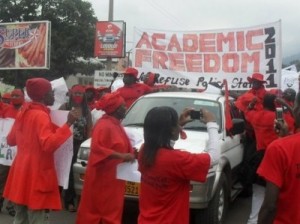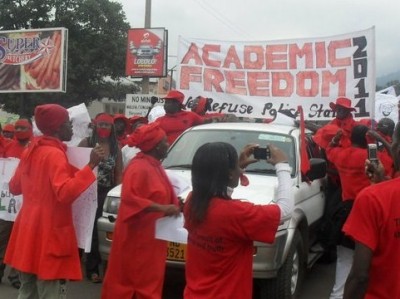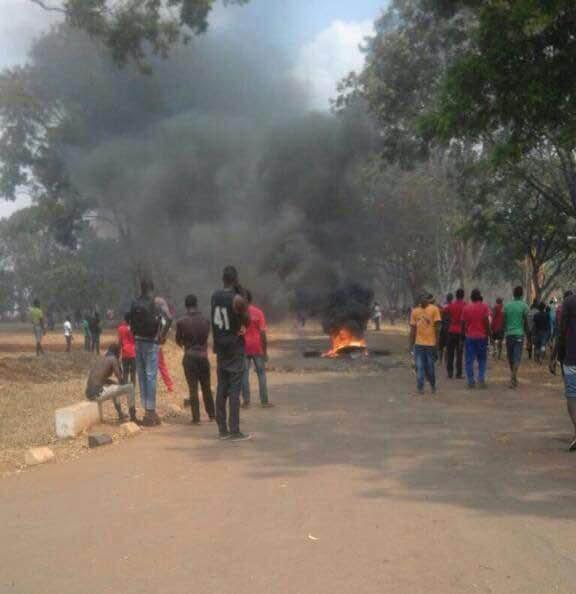There has been a disproportionate amount of criticism over the last years of students not acting exemplarily, demonstrating over trivia and general barbarism. Sound as the tirades may seem, they are very narrow. In this piece I will show you why students have to go on peaceful and sometimes violent demonstrations.
History reveals that student demonstrations have been a tool that many (students, politicians and society) have used extensively to change phenomena or even courses of history. Demonstrations do not just happen; they are the last resort after dialogue has failed or where the other powerful party is very good at using their blind eye.

Recall how French students forced President Charles de Gaulle to call for new elections and reform the defunct educational system in the late 60s. Remember that it was students that brought Iran true sovereignty by holding those American hostages for 444 days teaching the then US president, Jimmy Carter, the meaning on the word “non-interference.” Students of The Rangoon colleges in Burma also managed to force Ne Win, Sein Lwin and forced Maung Maung to move towards democracy in 1988.
Soweto demonstrations against Afrikaans in public schools and the Tiananmen Square demonstrations against communist rule in 1989 are some of the most famous that had students behind them. They are thus not a new thing, these demonstrations.
Students do not just go on the rampage for anything; they are inspired by great men; Stephen Biko was a student when he started the Black Consciousness Movement; Nelson Mandela was booted out of Fort Hare University for organizing demonstrations.
The University students are also exposed to the ideas of Karl Marx who teaches resistance to top-down decisions, Che Guevara, Islamic militancy and even radicals like Peter Macintosh who believed that “peace is the diploma one gets at the cemetery.”
Malawian students take the model of the American Students for a Democratic Society (ASDS) where representative democracy is a farce and participatory democracy a virtue. One Frenchman Daniel Cohn Bendt, another model and a student of sociology was once taunted by politicians for being “a nobody,” but his revolution rocked the whole of France with workers joining in.
Coming to Malawi, one would surely look at university students as empty souls wanting to be filled with some kind of wisdom. On the contrary, many students do whatever they do sober and it is after a general meeting where they decide on the best courses of action to take.
Nobody blames the university administration or government when students demonstrate and I know it’s because they only see the violence not the cause of the rioting. I don’t blame them. Here is a cross section of some of the events that shook UNIMA in this millennium and notice the facts of the students’ cases.
In 2000 Prof Mathews Chikaonda was appointed Minister of Finance and in his Ten Point Plan, he raised university fees from K1, 500 to K46, 000 arguing that university was a luxury and hence students should pay for it dearly. It was strange coming from a man whose career as we know it today sprung from the same university, so students protested. By the time the fees was reduced to K25, 000, the so called school calendar was well on a denting cruise.
2001 in December, Fanikiso Phiri was shot by a trigger-happy police officer when the students were demonstrating against the hiked maize prices, singer Evison Matafale’s death and the arrest of opposition politician Nelson Shaba: all noble causes. When students protested Fanikiso’s death, the colleges were closed and opened two months later with the calendar suffering badly.
2003: UDF supporters marching in favour of the much detested third term bill hurled insults at Poly students, the students retaliated and the police joined the UDF supporters to destroy property at the Poly including the precious DAF bus, who would not fight? Surprisingly the then principal suspended all students. A legal battle ensued and classes resumed, but time had gone and the calendar suffered.
February 2004, a student died in his sleep but the administration allowed examinations to go ahead, infuriated students rioted, as many would do. The students were sent home only to be called in May to finish the exam, a thing that could have been settled by suspending exams until after the student’s burial. The calendar was not waiting.
In 2007 lecturers wanted a 200% pay hike, inspired by the high MP salaries; the ensuing strike affected the calendar by at least five weeks. Instead of closing on 13th November the schools closed on 23rd December. Even in 2009 the semester that was supposed to begin on March 8 was pushed to the 23rd.
Some people say students should live by example, I ask, whose example? Even Jesus rebelled against the corrupt officials who turned the church into an agora. Patrick Chamaso, Malcolm X, both Martin Luther’s, Marcus Garvey, Mandela and their godfather Mahatma Gandhi didn’t believe in slavery of any kind. Actually Mandela said “To overcome oppression has been sanctioned by humanity and is the highest aspiration of every free man.”
Take for example the Polytechnic administration who would rather build a fence costing more than K27 million when students stay in substandard hostels in the Chichiri area and there is no hot water for the majority of students, are those not enough grounds to riot over?
Delaying stationery allowance for example is a thing that happens yearly, why can’t the process be hastened? Every year students have to submit identity photos and apply for the loan, why not make it electronic? Why not do there paper work when the students are on holiday?
The French students of 1968 rioted because the university running systems were archaic, staffed with aging octa- and nonagenarians, maybe it’s the same thing that is plaguing Malawi. It seems the administrators think like in the Kamuzu era.
The philosophy that the youths are the leaders of tomorrow is a farce because it implies that the elders should be the leaders now. Some youths are as competent as everyone else and the administrators should learn to consult with the youths because it is them that know the pressures and prerequisites of modernity.
The society should also understand dynamics of society, the students especially the social science ones, understand that the media have power so if they block the highway, for example, the media will report the issue directly to the relevant authorities with veto powers over the usually stubborn university administrators.
Many folks also make a lot of noise of changing the image of the university, I ask which university? University is a den of havoc where ideas are discussed without emotion or religion. Whatever the students decide is carefully cooked with engineers, business managers, journalists, lawyers and teachers of tomorrow in the midst. The students didn’t create the system, the system created the havoc.
Some of those who speak against the student demonstrations have done them and they can’t understand their younger counterparts. It’s a pity how folks forget.
Some riots are not even for the students sake, take the section 65 issue, some DPP party gurus booked the students a bus to go to parliament to help in pushing the budget through, the politicians then betray them and call them barbarians?
Society should also remember that most youths are just past puberty when they reach university so a flash of private parts or obscene words is but a good thing after all it’s a celebration of freedom from the strict home. When judging university students put yourselves in their shoes: there are hormones rushing in their veins, there are ladies to impress and there is a little philosophy in their minds. They are like a goat just getting to terms with new horns.
Most of the folks that criticize have not been to college thus they posses no knowledge of what it is to be a university leader. The students are being trained to become leaders and if they are oppressed the oppression will trickle to the people they will oversee. In 1968 Mexican president ignored the demands of the students and what followed was the creation and widening of the poor-rich gap.
How I wish Malawians saw the world as university students and more recently, lecturers do, in the world over society is respected by governments and students are given the respect they deserve because they act in unison.
Search Malawi, teachers would rather go for six months without pay to keep the peace. Farmers cannot even speak on their tobacco sales; reporters cannot even ask the right questions, where did we let fear run us? Where are the guys that ran with a colonialist’s head on a stick? Where are the guys that faced canon volleys at Nkhata-Bay? Where is my Malawi?
* Bright Baghaya is a journalism student at Poly





No comments! Be the first commenter?